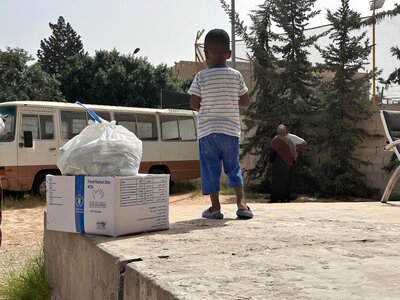Libya
- 803,000
- people in need of humanitarian assistance
- 6.9 million
- population
More than a decade after the 2011 Arab Spring and the subsequent civil war in Libya, years of political instability have left the country in a fragile state of transition to peace and stability.
To contribute to Libya's long-term recovery, peace and stability, the World Food Programme (WFP) address the needs of the most vulnerable communities – through emergency food assistance, sustainable-livelihood programmes and school-meal activities.
At the same time, WFP supports the Government in strengthening national systems to meet the food and other basic needs of vulnerable people.
WFP is working on a smooth transition from direct assistance to resilience-building activities, supporting the progressive development of sustainable food systems.
Since September 2023, Libya has been grappling with the aftermath of Storm Daniel, which devastated eastern Libya and caused mass displacement.
Furthermore, as the conflict in Sudan continues, displaced people are increasingly seeking refuge and assistance in Libya, with the border city of Al Kufra receiving the largest number of refugees. In response, WFP works with UN agencies and the authorities on access and overall support to meet growing humanitarian needs.
In addition, WFP has built partnerships with the Government of Libya, international organizations, local NGOs and civil society partners, the private sector, academia, research institutes, peacebuilding institutes and donor communities.
WFP also provides on-demand services such as logistics support, which helps UN partners reach and serve those people who depend on their support.
What the World Food Programme is doing in Libya
-
Food assistance
-
WFP assists food-insecure and vulnerable people, including internally displaced people, returnees, persons of concern and refugees, based on their food insecurity and vulnerability status. WFP provides food or cash-based transfers.
-
School meals
-
Resilience and livelihoods
-
Humanitarian coordination and common services
-
Research assessment and monitoring
Libya news releases
Go to pagePartners and donors
Find out more about the state of food security in Libya
Visit the food security analysis pageOperations in Libya
Contacts
Office
Immeuble Le Prestige, Tour F, Rue du lac Windemere, Les Berges du Lac 1
Tunis 1053
Tunisia






